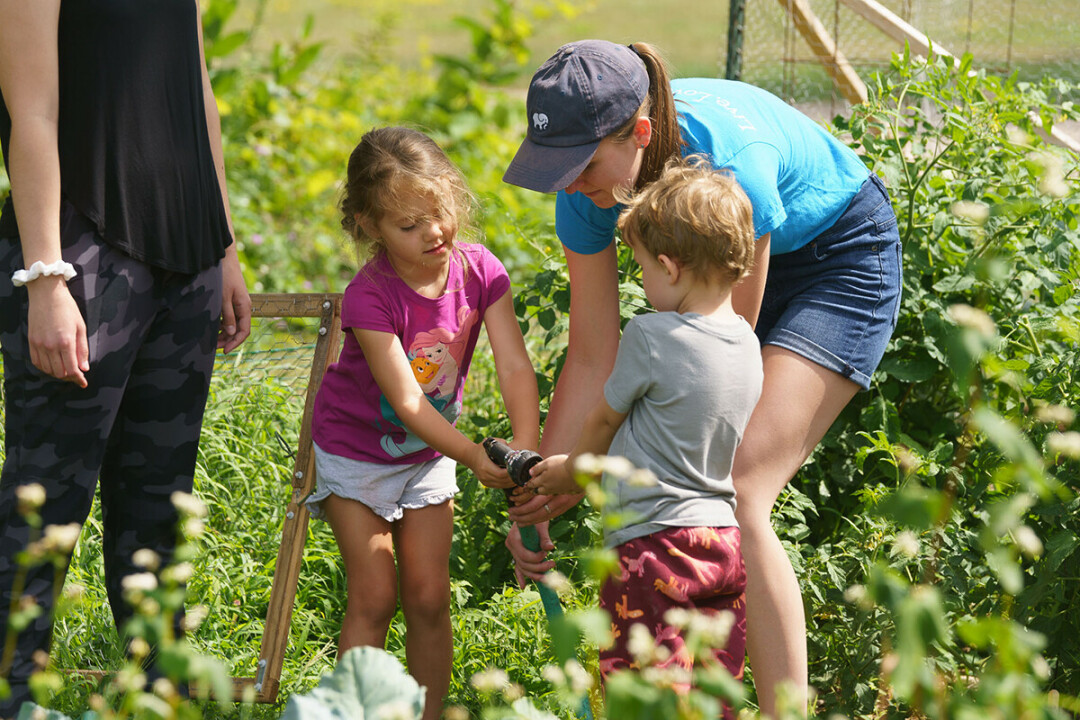UWEC Program Lets the Words Flow and Grow
building speech and language skills through gardening
Judy Berthiaume, UW-Eau Claire |

After COVID-19 shut down UW-Eau Claire’s in-person speech clinic a couple years ago, communication sciences and disorders faculty were eager to find a safe way to meet the needs of their student clinicians and the community members they serve.
Thinking creatively, they began a gardening project, bringing faculty, students, and community groups together in an outdoor space that encourages natural conversation and camaraderie.
“The summer garden groups are a great way to get our clients together outdoors to work toward a common goal,” says Megan Figg, a clinical instructor in communication sciences and disorders. “Also, our clinicians need to earn client therapy hours, and this is another way to do this during summer.”
Given the “overwhelmingly positive feedback” from students and clients, faculty are continuing the project again this summer, Figg says.
This year, CSD faculty, students and community group members of varying ages and needs are meeting weekly to tend to the vegetables, fruit and flowers they’re growing in two plots in the Forest Street Community Garden in Eau Claire. Three faculty members supervise the groups, with each group including one or two student clinicians and multiple community clients.
Figg supervises a pediatric community group that includes two young clients and their parents as well as student clinicians. The kids enjoy seeing how the garden grows from week to week, and they always are eager to participate, Figg says.
“We talk about the different vegetables and incorporate language and vocabulary into our group time,” Figg says. “While we are growing and tending the garden, our clients are working on a variety of communication skills in a more natural setting.”
Since the garden is thriving, the kids are harvesting some vegetables, “so everyone has something to take home that showcases the work they’ve put into the garden,” Figg says.
Figg says the student clinicians also benefit greatly from the garden project because it gives them experience working with groups in a natural environment that requires them to use their creativity to help their clients work on various communication skills.
The garden project is “extremely worthwhile and valuable” for students, says Dr. Tom Sather, an associate professor of communication science and disorders. By seeing how communication occurs in a less controlled setting, students can “see how communication may break down and also how communication can be supported,” he says.
“Rather than set up or create a scenario or communication task in a traditional clinic office setting, the garden has tons of authentic contexts for communication,” Sather says. “We communicate about how we should set up the garden, what should be planted where, or what tools we need. The vocabulary is right there, and the situation is authentic.”

Savanna Slettom, a second-year CSD graduate student from Little Falls, Minnesota, appreciates the opportunity to be part of a “different sort of therapy experience.”
“Having clinic rooms and a space available to do therapy is great, but it isn’t a natural environment,” Slettom says. “The more natural/functional the environment and therapy activity, the greater likelihood what we are working on in therapy will carry over outside the clinic room. Working in the garden is a project-based intervention that is natural and functional as well as fun. We take care of the garden while also working on our speech and language goals.”
Sarah Gifford, a second-year CSD graduate student from Waconia, Minnesota, agrees, saying it’s important to create opportunities for clients to practice communicating, socializing and problem-solving in a setting outside of a traditional clinic setting.
She also appreciates that she and other student clinicians can work with different populations during the summer project, says Gifford, who is in the Kids Communicate Garden Group and the BluGold Aphasia Group.
The BluGold Aphasia Group consists of adults who have aphasia, a language disorder often caused by a stroke that makes it difficult for people to understand language or produce spoken language. When the aphasia group gathers each week, members spend most of their time tending to the garden, but they also enjoy a variety of other shared activities, Gifford says.
“When we aren’t busy weeding, watering, repairing fencing and/or harvesting, we spend time socializing and doing crafts, such as painting rocks for #Rockingaphasia,” Gifford says. “It is a fun social outing for group members.”
The aphasia group members consistently indicate how much they enjoy the garden project, Sather says, noting that many members are gardeners who cut back due to their stroke or progressive aphasia. They like getting out of the house, spending time outdoors, being around people they enjoy and working on something that produces tangible results, he says.
The garden also is a way for people with aphasia to provide a genuine service because their work and expertise put them in a different role than just receiving therapy, Sather says. They contribute to the garden, but also to students’ knowledge about gardening and communication, he says.
Working with the pediatric garden group is a different, though equally rewarding, experience, Gifford says.
“With the preschoolers, we spend time leading fun outdoor activities and crafts that help them practice producing different speech sounds,” Gifford says. “When we are not practicing our speech sounds, they take turns watering the different rows in the garden, weeding and harvesting vegetables. So, they are developing their speech and language skills, but get to have a lot of fun while doing it.”
Funding for the gardening project came from the family of Abigail Stellmacher, who earned her degrees from UW-Eau Claire in 2009 and 2011; the Chippewa Valley Aphasia Group; and monetary and plant donations from group members, students, staff, and faculty.


















